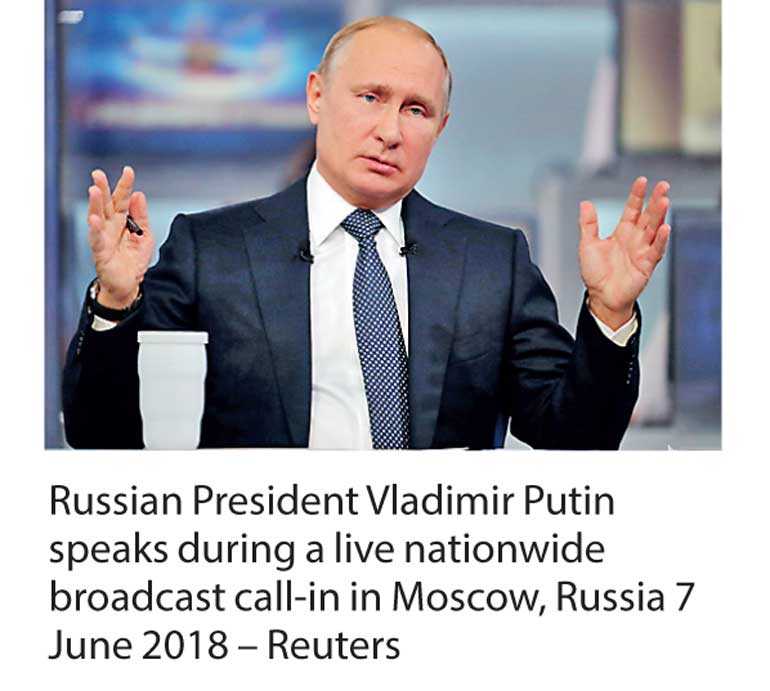Saturday Feb 21, 2026
Saturday Feb 21, 2026
Friday, 8 June 2018 00:00 - - {{hitsCtrl.values.hits}}
 Moscow (Reuters): Vladimir Putin, on a drive to boost living standards at the start of a new presidential term, tried to reassure Russians about their economy on Thursday in a live TV question-and-answer marathon.
Moscow (Reuters): Vladimir Putin, on a drive to boost living standards at the start of a new presidential term, tried to reassure Russians about their economy on Thursday in a live TV question-and-answer marathon.
Putin, who easily won re-election in March, has since 2001 used the annual phone-in with citizens to cast himself as a decisive troubleshooter on the home front and a staunch defender of Russia’s interests on the world stage.
Critics say the event, being held days before Russia hosts the soccer World Cup, is a stage-managed piece of theatre designed to let Russians let off steam and fleetingly feel as if they can influence a bureaucratic top-down system. Putin and his aides say it is an indispensable tool to gauge public sentiment and learn about people’s real problems.
“We are heading in the right direction,” said Putin. “We are on a trajectory of stable economic growth. Yes, it’s modest growth, but it’s not falling.”
Putin told a man who phoned in from the wheel of his truck that he agreed with him that petrol prices were rising too fast.
“It’s unacceptable,” said Putin.
The Russian central bank forecasts economic growth at between 1.5% and 2% this year.
At last year’s phone-in, the president, now 65, pledged to eradicate spiralling poverty, fielding almost 70 questions in just under four hours in an event that Kremlin-watchers liken to a tsar listening to his petitioners.
This year, Putin dispensed with his usual studio audience, fielded text and video questions, and was poised to hand out real-time orders to regional governors, government ministers and state company heads who were shown on giant TV monitors sitting at their desks across Russia waiting for his instructions.
Members of the public had submitted around 2 million questions, state TV reported, many of them visible on a website set up for the event.
Questions posted ahead of the event included whether Putin planned to meet US President Donald Trump this year, whether relations with the West would improve anytime soon, and how he planned to reduce poverty.
Putin, who is at the start of a new six-year term, always fields a smattering of foreign policy questions, which he typically uses to lash out at the West, with whom Moscow’s relations are at a post-Cold War low.
This year, he was expected to focus more heavily on domestic issues since he has said the main priority of his fourth term is raising living standards by sharply increasing social and infrastructure spending.